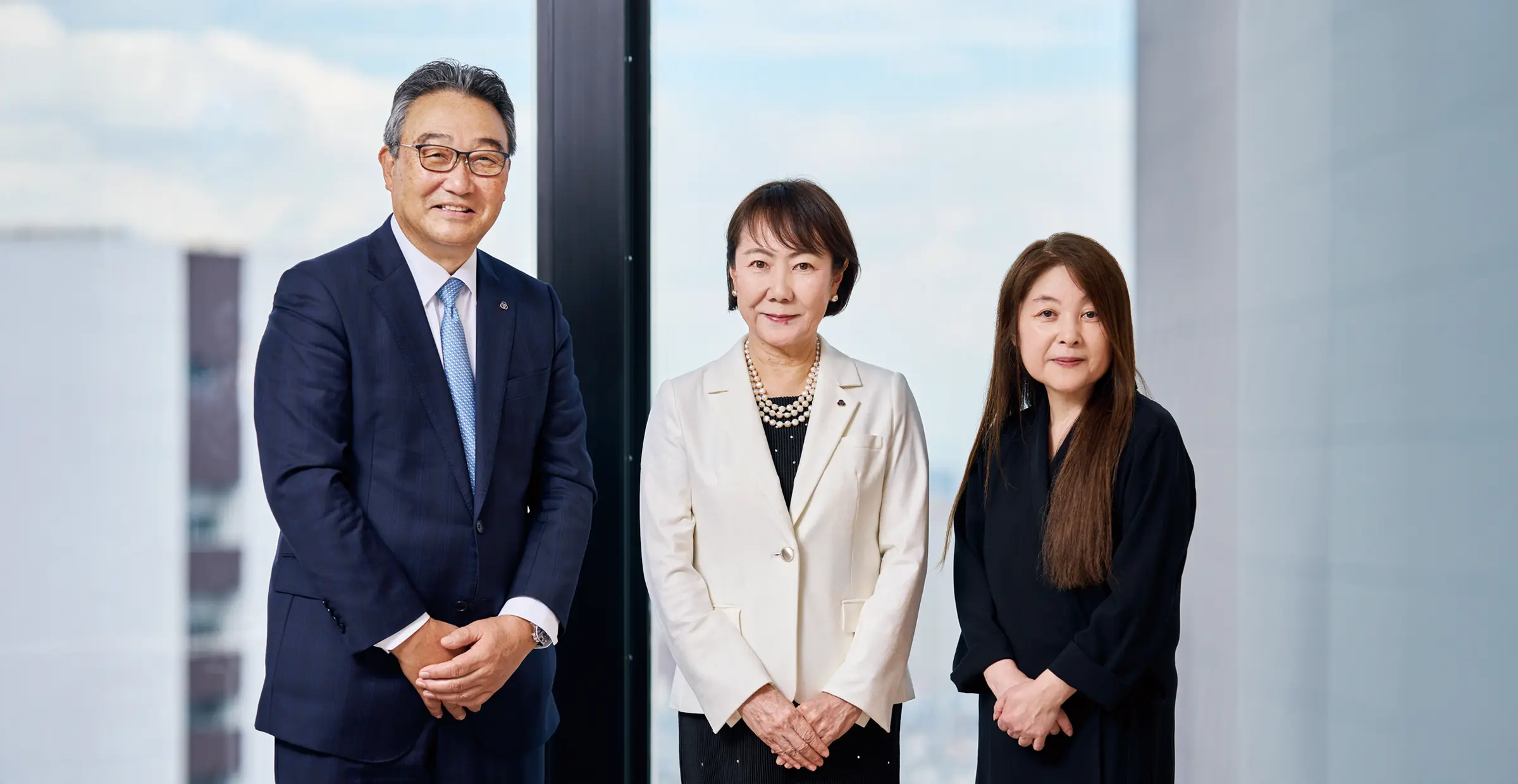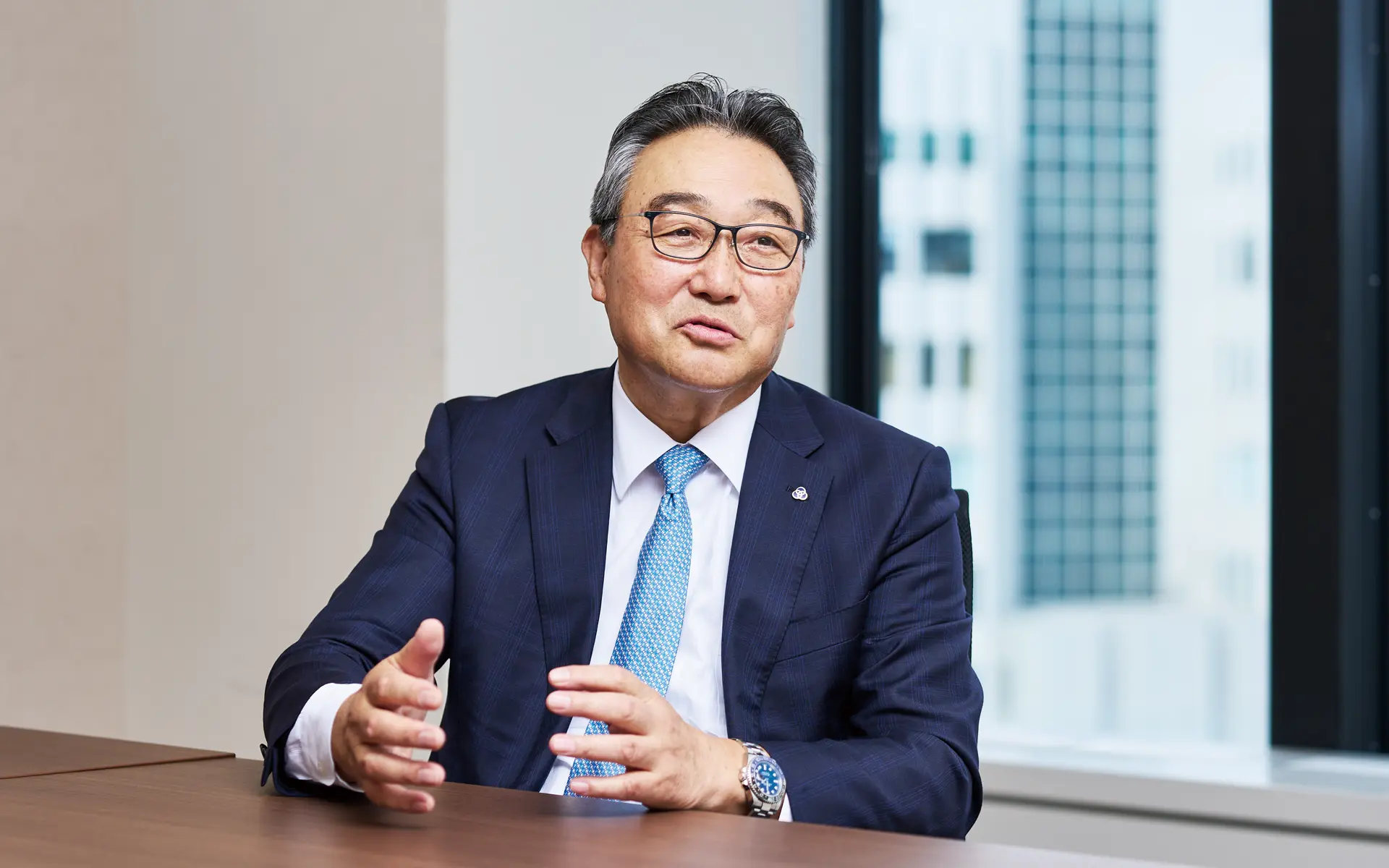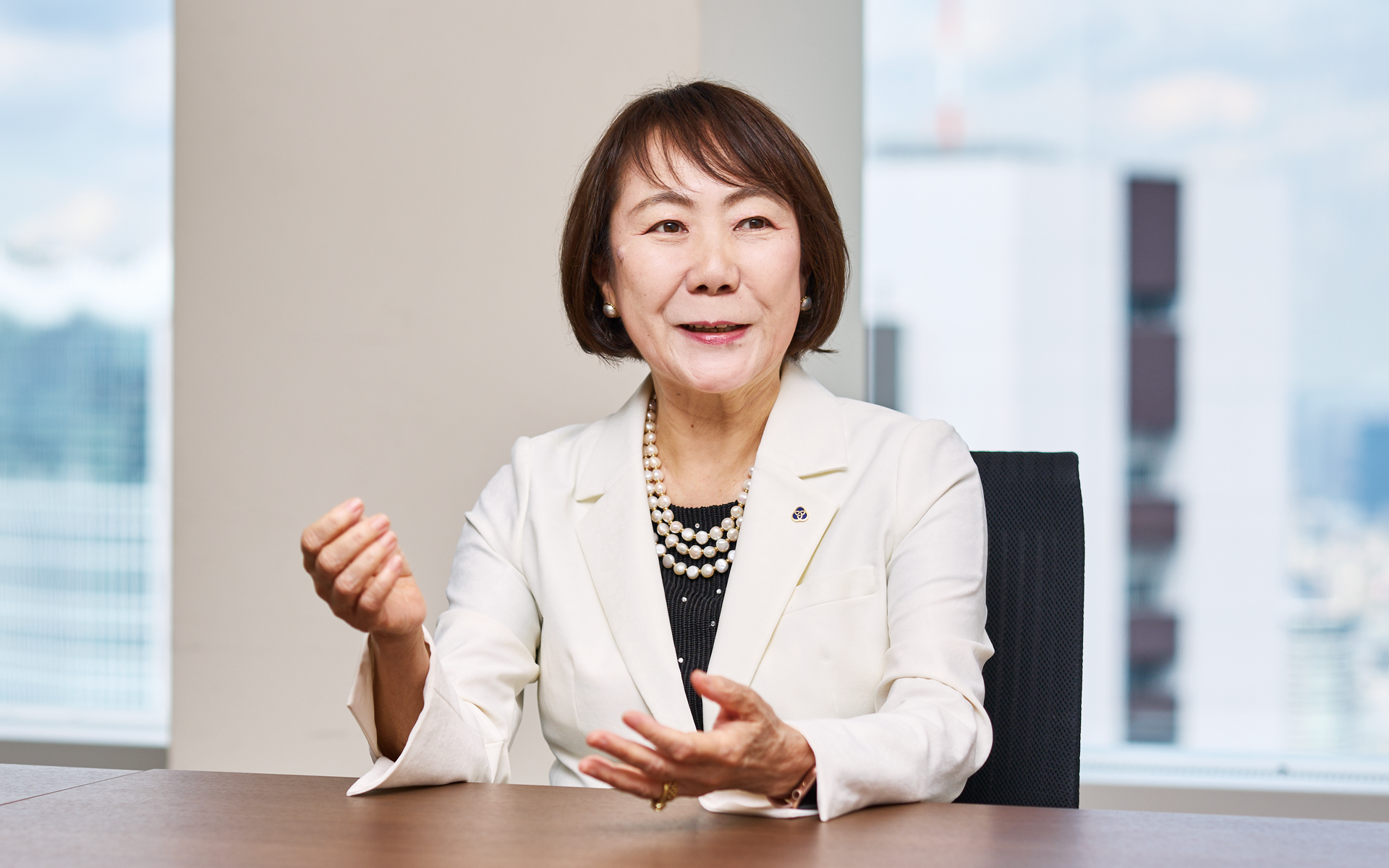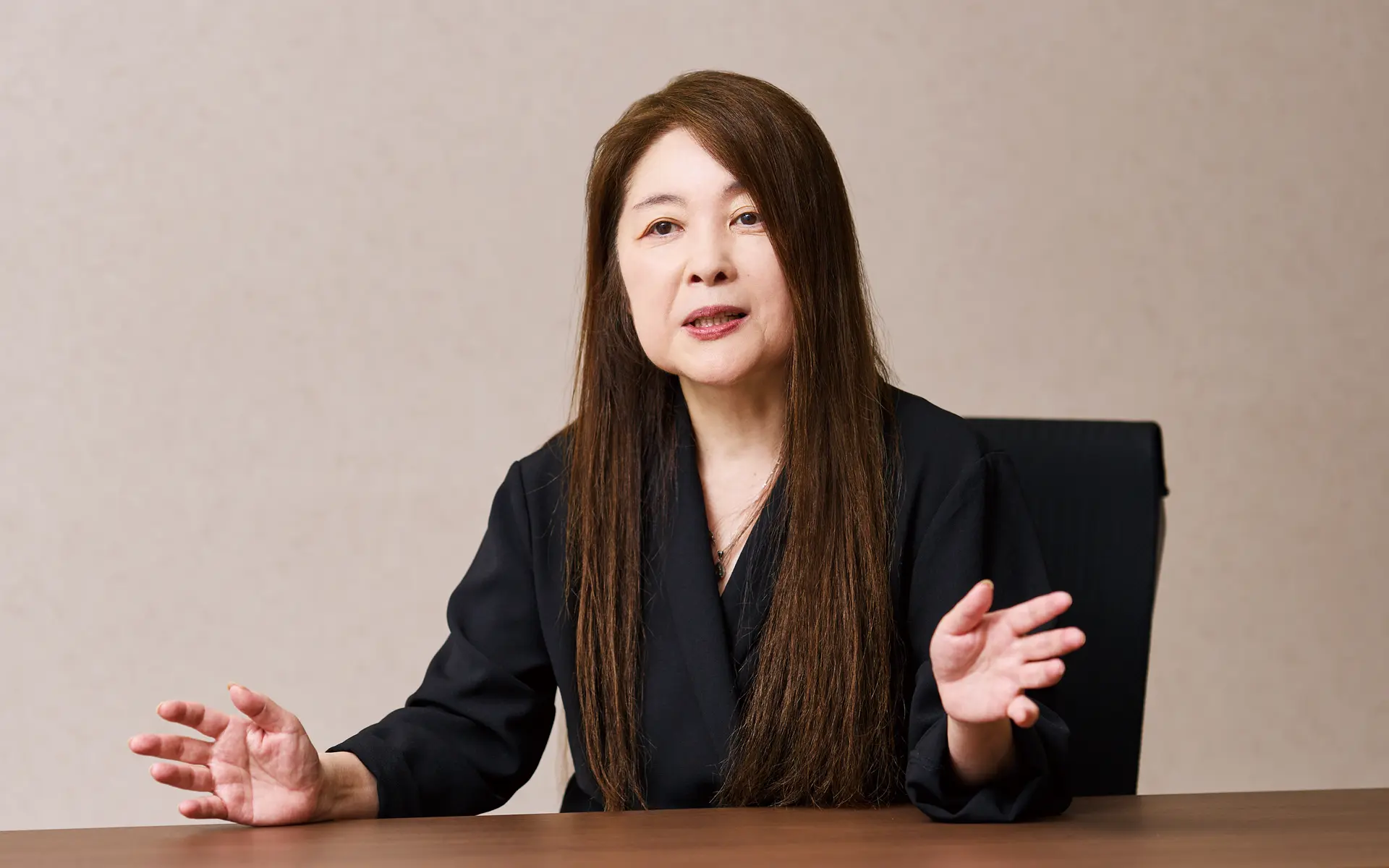Dialogue with Outside Directors and Analysts
Status and Challenges toward Becoming a Global Leader in Smart Entrance Solutions

(Photo on the Left)
Masanaka Yokota
Outside Director
After joining JMA Consultants Inc., Mr. Masanaka Yokota provided advice and guidance on corporate management strategy, production and manufacturing, and human resource development. After serving in various important positions, including Managing Director and President of Chinese and European subsidiaries, he was appointed as an Outside Director of the Company in June 2020, where he provides advice and suggestions on overall management.
(Photo on the Center)
Hiroko Ishimura
Outside Director
After joining The Mitsubishi Bank, Ltd., Ms. Hiroko Ishimura joined Cincom Systems Japan Ltd. in 1991, where she held important positions, including Marketing Manager and Representative Director. She was appointed as an Outside Director of the Company in 2022 and provides advice and suggestions on the use of IT and digital technology.
(Photo on the Right)
Mariko Watanabe
Senior Analyst
Executive Director
UBS Securities Japan Co., Ltd.
In 1991, Ms. Mariko Watanabe joined Kokusai Securities Co., Ltd. Since then, she has been involved in industry research and financial analysis as a securities analyst at several foreign securities firms until joining UBS Securities Japan Co., Ltd. in 2004. As a certified member of the Securities Analysts Association of Japan, she serves as a bridge between companies and investors.
- Reprinted from Integrated Report 2024
In fiscal 2022, Sanwa Holdings formulated its Long-Term Vision, Sanwa Global Vision 2030. The first phase of the plan, the Medium-Term Management Plan 2024, has been successfully completed, and the second phase, the Medium-Term Management Plan 2027, began in fiscal 2025. Two outside directors exchanged opinions with facilitator Mariko Watanabe, Senior Analyst at UBS Securities, on current issues and areas to focus on in the future as we move forward with the new Medium-Term Management Plan.
Summary of the Medium-Term Management Plan 2024
Watanabe: March 31, 2024 marked the conclusion of the Medium-term Management Plan 2024. Achievement of various performance targets suggests a favorable outcome to this plan. How would you evaluate the Company's performance during the plan?
Yokota: For Sanwa Holdings, the previous Medium-Term Management Plan was to be a very important first step toward the Sanwa Global Vision 2030. Despite the many lingering uncertainties as the COVID-19 pandemic came under control, business in Japan and North America remained steady, resulting in a satisfactory overall performance. The strong performance in Japan and North America can be attributed to the fact that the Company was able to pass on the higher costs of raw materials and other items to selling prices, as well as to improve productivity and take cost reduction initiatives. I believe that the smooth acceptance of the price shift was thanks to the Sanwa Group's excellent products and services, and the fact that the Group was able to gain the trust of its customers on a daily basis.
Isimura: Sanwa delivered excellent results in the previous Medium-Term Management Plan. Particularly in the Japanese market, my assessment reveals strong results despite numerous challenges in the manufacturing industry, such as Japan's 2024 logistics problem due to driver shortages and the 2025 digital cliff caused by legacy system maintenance difficulties. After assuming the position of outside director, what impressed me most strongly was that the company has a very solid organizational structure. I believe that the results of the Group's steady and continuous implementation of the PDCA cycle are reflected in the excellent financial indicators it has now achieved.
Watanabe: My impression is also that many investors highly rate the results generated in the last three years. However, are there challenges, including those not shown in the numbers, that you can point to?
Yokota: By region, Japan and the U.S. performed well, while Europe struggled. One of the reasons for this is that M&A did not proceed as expected, and how to grow in this area is a major issue for the next stage. Although it is commendable that the Group was able to turn a profit in Asia, it still must seek greater profits, especially in China and Vietnam. In terms of products, I believe there is room for growth in products addressing disaster preparedness and climate change. These products account for about 30% of the Group's net sales and can already be considered a strength, but I believe that there is plenty more expansion possible in this area. I see this as an important point for the next stage of growth.

Ishimura: I believe that productivity improvement through digitalization and manufacturing innovation is an area where the Group must steadily and consistently transform and improve. The manufacturing industry is currently experiencing a major wave of new, influential solutions in the form of AI and IoT, and it is important to address these technologies in a circumspect, steady, and strategic way. Systems for digitalization are not set-and-forget; they must be constantly updated. In parallel, the products and services offered must be made digital themselves. AI and other digital technologies are essential for applying IoT to products and developing service businesses, but hastily jumping on those technologies may not lead to immediate results. It is necessary to check effectiveness as you move forward, and to be consistent.
Expectations for the Medium-Term Management Plan 2027
Watanabe: A new Medium-Term Management Plan has started in fiscal 2025. I belie ve this current plan faces a different kind of challenging times v ersus the past three years. What are the key points you emphasize as an outside director?
Yokota: The most important thing is the investment policy, including M&A. The plan is to invest a total of 100 billion yen in M&A, capital expenditures, and IT/digital investments, and it should be vital to put this into practice properly. If the investment goes well, for example in the Americas, we believe it will lead to further market share expansion and improved profitability. The importance of these investments has been constantly discussed by the Board of Directors, not only in the current Medium-Term Management Plan.
Ishimura: The Board of Directors continues to discuss advancing sustainability management. The underlying spirit when Sanwa was founded was love, trust, and hard work, truly the foundation of sustainable management. This underlying spirit was a marvel to me when I joined Sanwa Holdings as an outside director. The underlying spirit from the Company's founding has been handed down through the years, and this has led to the Sanwa Group's current Corporate Mission of being "committed to offering products and services that provide safety, security and convenience to further contribute to the prosperity of society." The PDCA cycle, which is used to put this mission into action, is also strongly ingrained in the Group's corporate culture. I believe this unwavering attitude is a major driving force behind our growth and should encourage the promotion of sustainability management. In the current Medium-Term Management Plan, while scaling will be important, I also believe that what is even more important is improving quality. Improving the quality of everything, including products and employee capabilities, through sustainability management should also be a key factor in business expansion.
Watanabe: The final goals of this Medium-Term Management Plan are operating profit of 100 billion yen and an operating profit ratio of 13.3%*. This number can only be achieved with a foundation built from decades of effort, not just in the past three years. Given this, I think the Sanwa Group can maintain similar growth over the long term ahead, but what hurdles need to be overcome in order to grow even more?
- Before amortization of goodwill
Yokota: Human capital development and management are still important. Not only Sanwa Holdings, but all Japanese companies are struggling to secure human resources, and I think this is a high hurdle that must be overcome. Compared to a short time ago, Sanwa Holdings has gained more exposure through advertising and other means. This has also attracted the interest of job seekers. In order to secure even more talented personnel, it will be important to use a variety of other tools in addition to advertising. The Japanese manufacturing industry, not just Sanwa Holdings, is generally structured in such a way that discipline is determined from the top down, and QCD (quality, cost, and delivery) is ensured by the field's strict adherence to standard methods. While this has no doubt contributed to its strength, organization must transform so that each individual can freely express their own opinions in order to better demonstrate their abilities.
Ishimura: I agree that organizational development is important. What is needed here is to create opportunities for exposure to ideas from outside the company. Having been in a position of corporate management for a long time, I have realized that focus inevitably narrows to internal concerns. Meanwhile, companies with strengths in developing human capital focus on external training and learnings from outside as well as internal training. My hope is that Sanwa Holdings will consider modifying its approach to human capital development with such efforts in mind.
Yokota: Outside directors have often expressed their opinions on the review of the personnel system. I believe that this is a difficult topic with no immediate answer or correct answer, but there must be time provided to have a thorough discussion.
Ishimura: A moment ago, I mentioned digital technologies as an issue from the previous Medium-Term Management Plan.Investment in IT and other digital technologies is a basic strategy in the current Medium-Term Management Plan, but I am still concerned about whether digitalization will proceed as planned. In utilizing and promoting IT and other digital technologies, you never know what kind of trouble you may encounter along the way. Therefore, it is difficult to predict whether the investment amount of 10 billion yen, which is set in the current Medium-Term Management Plan as planned, will be sufficient to deal with various situations. It may be necessary to anticipate the need for a review during the process.
Yokota: Business process improvement through digitalization is a theme that requires steady action. The digitalization of Sanwa Holdings' services and products, as mentioned earlier, is the Company's responsibility as a dominant industry player by market share.
Watanabe: The balance between investment in growth and shareholder returns is also a key point in this Medium-Term Management Plan. Sanwa Holdings' capital efficiency figures, such as ROE and ROIC, have improved dramatically over the last decade. I have observed many companies in my career, and I have never seen such an improvement. This is probably due to the fact that Sanwa Holdings has been emphasizing shareholder returns in addition to improving profit margins. I believe that many shareholders appreciate this consistent stance and the cash allocations to further improve it. What do you two think?
Yokota: The change to DOE as an indicator of dividend policy has been highly appreciated by all outside directors. I feel that the ongoing discussions in the interest of capital efficiency have been put to good use in this indicator change. On the other hand, the Company's assumed amount of investment in growth, including M&A, feels somewhat cautious. I have said that they should consider this as a minimum line to exceed, and that they should invest more aggressively for the future. In particular, M&A is an area that did not go well in the previous Medium-Term Management Plan, so I would like to see the Company actively engage here.
Ishimura: Not only that, but given the current shortage of IT talent in the market, there may be room for improvement in the speed of decisions regarding IT investment decisions in order to secure outsourced human resources. For major investment decisions, the Company, as the holdings company, needs to make the final decision. This can slow down the speed of decision making. In order to ensure that growth investments are carried out, it would be helpful to make some operational innovations to strengthen the functions of the Board of Directors, such as holding special Board meetings for investment decisions.

Sanwa Holdings' Corporate Governance
Watanabe: Let's also talk about your assessment of corporate governance as outside directors?

Yokota: Mr. Michael Morizumi was appointed as a new outside director and Audit & Supervisory Committee member in June 2025. He is an American and has experience and knowledge as an analyst in addition to corporate management. In addition, Mr. Naoto Yamaoka was appointed as an Audit & Supervisory Committee and inside director. This enhancement of the Board's headcount has made the system more heartening.
Ishimura: I have only been in office for about three years, so I have much to learn from the discussions of the other outside directors, but they are quick to respond to my questions, and I am often asked for advice on women's empowerment and digitalization. I believe that we have a good open atmosphere because we are given opportunities to communicate with the Company's employees.
Watanabe: As an outside director, what do you stay mindful of?
Yokota: I try to maintain a perspective on whether the quality of our products and services is appropriate. For manufacturers, the attitude of providing better products is of utmost importance, and I try to speak out with a strong awareness of this.
Ishimura: I try to look at products and services from the consumer's perspective. Since becoming an outside director of the Company, I have noticed many more shutters in my daily life. From a consumer perspective, I actively collect information that I believe is necessary for the Sanwa Group and provide feedback.
Future Expectations for the Sanwa Group
Watanabe: What are your expectations for the Sanwa Group in the future, respectively?
Yokota: The current Medium-Term Management Plan marks the exact halfway point toward the Sanwa Global Vision 2030. I feel that the Company needs to take a moment to discuss and define what it means to be a "Global Leader in Smart Entrance Solutions" as set forth in our Long-Term Vision. Specifically, it will be necessary to sort out what kind of product mix the Company is aiming for, and whether the roles of the holding company and each business company are appropriate in order to become a truly global company. We, as outside directors, will also consider this together. As the Company promotes human capital management, it must also pursue employee engagement. Employees are a company's most important stakeholders. I believe that the start of this new Medium-Term Management Plan should be an opportunity to discuss what kind of company to become in order to be a good company where employees can work with pride.
Ishimura: I hope that Sanwa Holdings employees will firmly practice the Company's founding spirit of love, trust, and hard work, and that the Company will continue to help people lead safe, secure, and comfortable lives. As part of this effort, it is my desire the Company will work to further promote the empowerment of women. Women's empowerment is still limited in scope, not only at the Company but in the construction industry overall. I would like to see management make the most of individual abilities so that everyone is given the opportunity to develop their careers, rather than making distinctions based on gender. Another area that needs attention, in my view, is a reassessment of PR messaging. My sense is that, since Sanwa Holdings' business is BtoB, I feel that there is an internal perception that it's okay to not have much public recognition. But, is that something that we can afford to ignore? In fact, there are times that I feel the Company makes a truly excellent product that can contribute to society, but that the Company is not doing a good job of appealing to the public. Successfully pitching such a product would improve the Company's image and attract even better talent. Employees would be able to work with more pride.
Watanabe: I feel the same way as Ms. Ishimura. Sanwa Shutter Corporation in Japan, ODC in the United States, and Novoferm Group in Europe are all valuable brands. Despite the fact that many people use some version of their products in their daily lives, these brands are not as well recognized in the general public as its valuation in the stock market. I feel that if the Sanwa Group can successfully appeal to the public, it can become more widely known. Today's dialogue gave us a glimpse of directors with different perspectives discussing and striving for the happiness of the Sanwa Group's stakeholders. The Sanwa Group offers a promising future as an organization that can make all stakeholders happy, including not only shareholders, but also employees and end users. Thank you for this valuable opportunity.
